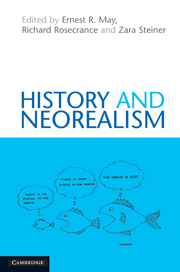Book contents
- Frontmatter
- Contents
- List of tables
- Notes on contributors
- Acknowledgments
- 1 Theory and international history
- 2 Transformations in power
- 3 Domestically driven deviations: internal regimes, leaders, and realism's power line
- 4 How international institutions affect outcomes
- 5 Not even for the seventeenth and eighteenth centuries: power and order in the early modern era
- 6 Austria-Hungary and the coming of the First World War
- 7 British decisions for peace and war 1938–1939: the rise and fall of realism
- 8 Realism and risk in 1938: German foreign policy and the Munich Crisis
- 9 Domestic politics, interservice impasse, and Japan's decisions for war
- 10 Military audacity: Mao Zedong, Liu Shaoqi, and China's adventure in Korea
- 11 The United States' underuse of military power
- 12 The overuse of American power
- 13 Redrawing the Soviet power line: Gorbachev and the end of the Cold War
- 14 Shared sovereignty in the European Union: Germany's economic governance
- 15 John Mearsheimer's “elementary geometry of power”: Euclidean moment or an intellectual blind alley?
- 16 History and neorealism reconsidered
- Index
- References
5 - Not even for the seventeenth and eighteenth centuries: power and order in the early modern era
Published online by Cambridge University Press: 05 June 2012
- Frontmatter
- Contents
- List of tables
- Notes on contributors
- Acknowledgments
- 1 Theory and international history
- 2 Transformations in power
- 3 Domestically driven deviations: internal regimes, leaders, and realism's power line
- 4 How international institutions affect outcomes
- 5 Not even for the seventeenth and eighteenth centuries: power and order in the early modern era
- 6 Austria-Hungary and the coming of the First World War
- 7 British decisions for peace and war 1938–1939: the rise and fall of realism
- 8 Realism and risk in 1938: German foreign policy and the Munich Crisis
- 9 Domestic politics, interservice impasse, and Japan's decisions for war
- 10 Military audacity: Mao Zedong, Liu Shaoqi, and China's adventure in Korea
- 11 The United States' underuse of military power
- 12 The overuse of American power
- 13 Redrawing the Soviet power line: Gorbachev and the end of the Cold War
- 14 Shared sovereignty in the European Union: Germany's economic governance
- 15 John Mearsheimer's “elementary geometry of power”: Euclidean moment or an intellectual blind alley?
- 16 History and neorealism reconsidered
- Index
- References
Summary
Political scientist Stanley Hoffmann once reportedly remarked that Kenneth Waltz's structural realist or neorealist theory of international relations was a good theory for the seventeenth century. Whatever else it might imply, as a factual statement the remark seemed accurate. Neorealist theory, originally expounded by Waltz and now advanced in various versions including the offensive realism of John Mearsheimer discussed in this volume, apparently fits European international politics in the early modern era especially well. The pattern of recurrent, almost constant conflicts, crises, and wars in 1648–1789 seemed to confirm a central neorealist principle: that interstate competition and violent conflict derive from the systemic structure of international relations, in which various independent units in close contact and continual interaction with one another constantly compete for survival and vital scarce resources. The system dynamics that neorealists see created by this structure also seem appropriate to this era as one in which international anarchy, i.e., the absence of any recognized law-giver or law-enforcing authority, compelled each unit to make its prime aim the acquisition and exercise of power, especially military power, in order to survive and be secure. The theory also seems to account for the principles and practices of amoral power politics that dominated the era, and to explain its characteristic patterns of alliance and alignment: bids by would-be hegemons and imperial powers to gain full security through maximizing their power while weaker powers tried to survive either by hiding from them, joining them, or coalescing and balancing against them.
- Type
- Chapter
- Information
- History and Neorealism , pp. 78 - 102Publisher: Cambridge University PressPrint publication year: 2010
References
- 1
- Cited by



